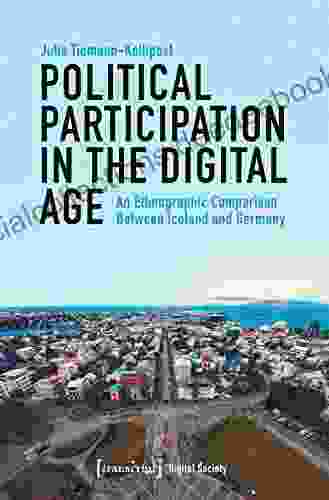An Ethnographic Comparison Between Iceland and Germany: Digitale Gesellschaft 25

Digitalization is rapidly changing the world as we know it. From the way we communicate to the way we work, digital technologies are having a profound impact on all aspects of our lives. Governments around the world are recognizing the importance of digitalization and are investing heavily in initiatives to promote digital transformation.
5 out of 5
| Language | : | English |
| File size | : | 4259 KB |
| Text-to-Speech | : | Enabled |
| Screen Reader | : | Supported |
| Enhanced typesetting | : | Enabled |
| Print length | : | 283 pages |
One such initiative is the German government's Digitale Gesellschaft 25 (Digital Society 25) strategy. Launched in 2016, Digitale Gesellschaft 25 is a comprehensive plan to make Germany a leading digital nation by 2025. The strategy focuses on five key areas:
* Digital infrastructure * Digital economy * Digital government * Digital education * Digital society
Digitale Gesellschaft 25 is an ambitious goal, but it is one that is essential for Germany's future success. In a world that is increasingly digital, countries that are not able to keep up will be left behind.
Iceland and Germany: Two Different Approaches to Digitalization
Iceland and Germany are two countries with very different approaches to digitalization. Iceland is a small, sparsely populated country with a long history of innovation and technological adoption. Germany, on the other hand, is a large, industrialized country with a complex regulatory environment.
Despite their differences, Iceland and Germany are both facing the same challenges when it comes to digitalization. Both countries need to find ways to bridge the digital divide, improve digital literacy, and promote digital innovation.
In this article, we will present an ethnographic comparison between Iceland and Germany. We will explore how the two countries are implementing the Digitale Gesellschaft 25 strategy and what the implications are for the future of digitalization in Europe.
Methodology
This study is based on ethnographic research conducted in Iceland and Germany in 2018 and 2019. The research team conducted interviews with government officials, business leaders, and citizens in both countries. The team also observed how digital technologies are being used in everyday life in Iceland and Germany.
Findings
The research team found that Iceland and Germany are taking very different approaches to digitalization. Iceland is taking a more bottom-up approach, with a focus on grassroots innovation and citizen engagement. Germany, on the other hand, is taking a more top-down approach, with a focus on government-led initiatives and regulation.
Both approaches have their own advantages and disadvantages. Iceland's bottom-up approach has led to a high level of digital literacy and innovation. However, it has also led to some fragmentation in the digital landscape. Germany's top-down approach has led to a more coordinated and comprehensive approach to digitalization. However, it has also led to some concerns about government overreach and regulation.
The research team also found that there are a number of challenges that both Iceland and Germany need to address in order to achieve their digitalization goals. These challenges include:
* The digital divide: There is a significant digital divide between different groups of people in both Iceland and Germany. This divide is based on factors such as age, income, and education. * Digital literacy: Many people in both Iceland and Germany lack the digital skills needed to fully participate in the digital economy. * Digital innovation: Both Iceland and Germany need to do more to promote digital innovation. This includes investing in research and development and creating an environment that is conducive to start-ups.
Implications for the Future of Digitalization in Europe
The findings of this study have important implications for the future of digitalization in Europe. First, they show that there is no one-size-fits-all approach to digitalization. Countries need to tailor their approaches to their own unique circumstances.
Second, the study shows that the digital divide is a major challenge that needs to be addressed in order to achieve a truly inclusive digital society.
Third, the study shows that digital literacy is essential for full participation in the digital economy. Governments need to invest in digital literacy programs to ensure that everyone has the skills they need to succeed in the digital age.
Finally, the study shows that digital innovation is key to driving economic growth and social progress. Governments need to create an environment that is conducive to digital innovation.
Digitalization is rapidly changing the world as we know it. Countries around the world are recognizing the importance of digitalization and are investing heavily in initiatives to promote digital transformation.
Iceland and Germany are two countries with very different approaches to digitalization. Iceland is taking a more bottom-up approach, with a focus on grassroots innovation and citizen engagement. Germany, on the other hand, is taking a more top-down approach, with a focus on government-led initiatives and regulation.
Both approaches have their own advantages and disadvantages. Iceland's bottom-up approach has led to a high level of digital literacy and innovation. However, it has also led to some fragmentation in the digital landscape. Germany's top-down approach has led to a more coordinated and comprehensive approach to digitalization. However, it has also led to some concerns about government overreach and regulation.
The findings of this study have important implications for the future of digitalization in Europe. First, they show that there is no one-size-fits-all approach to digitalization. Countries need to tailor their approaches to their own unique circumstances.
Second, the study shows that the digital divide is a major challenge that needs to be addressed in order to achieve a truly inclusive digital society.
Third, the study shows that digital literacy is essential for full participation in the digital economy. Governments need to invest in digital literacy programs to ensure that everyone has the skills they need to succeed in the digital age.
Finally, the study shows that digital innovation is key to driving economic growth and social progress. Governments need to create an environment that is conducive to digital innovation.
The future of digitalization in Europe is bright. However, there are a number of challenges that need to be addressed in order to ensure that everyone can benefit from the digital revolution. By working together, we can create a digital society that is inclusive, prosperous, and sustainable.
5 out of 5
| Language | : | English |
| File size | : | 4259 KB |
| Text-to-Speech | : | Enabled |
| Screen Reader | : | Supported |
| Enhanced typesetting | : | Enabled |
| Print length | : | 283 pages |
Do you want to contribute by writing guest posts on this blog?
Please contact us and send us a resume of previous articles that you have written.
 Novel
Novel Page
Page Chapter
Chapter Genre
Genre Library
Library Paperback
Paperback Newspaper
Newspaper Paragraph
Paragraph Bookmark
Bookmark Shelf
Shelf Glossary
Glossary Bibliography
Bibliography Foreword
Foreword Footnote
Footnote Manuscript
Manuscript Scroll
Scroll Codex
Codex Tome
Tome Classics
Classics Library card
Library card Narrative
Narrative Biography
Biography Memoir
Memoir Thesaurus
Thesaurus Character
Character Resolution
Resolution Catalog
Catalog Card Catalog
Card Catalog Archives
Archives Periodicals
Periodicals Research
Research Reading Room
Reading Room Special Collections
Special Collections Literacy
Literacy Study Group
Study Group Dissertation
Dissertation Storytelling
Storytelling Reading List
Reading List Theory
Theory Textbooks
Textbooks S E Green
S E Green Nita Tewari
Nita Tewari M Y E Moda Formal
M Y E Moda Formal Sandra Millman Verand
Sandra Millman Verand Denise Brienne
Denise Brienne Ellen Mitten
Ellen Mitten Mark Ager
Mark Ager Orestes Augustus Brownson
Orestes Augustus Brownson Anita Lavi
Anita Lavi Farhad Taghizadeh Hesary
Farhad Taghizadeh Hesary Hyewon Yum
Hyewon Yum David R Slayton
David R Slayton Paul O Mahony
Paul O Mahony Edwin Black
Edwin Black Tracy Burton
Tracy Burton Annette Fuentes
Annette Fuentes David Bohlke
David Bohlke Charlotte Eriksson
Charlotte Eriksson Tarek El Ariss
Tarek El Ariss Erik O Ronningen
Erik O Ronningen
Light bulbAdvertise smarter! Our strategic ad space ensures maximum exposure. Reserve your spot today!

 Brandon CoxKanaka Maoli and Critical Settler Cartographies in Hawai'i: Decolonizing Maps...
Brandon CoxKanaka Maoli and Critical Settler Cartographies in Hawai'i: Decolonizing Maps... Dawson ReedFollow ·19.8k
Dawson ReedFollow ·19.8k Shawn ReedFollow ·15.5k
Shawn ReedFollow ·15.5k Bernard PowellFollow ·13.2k
Bernard PowellFollow ·13.2k Luke BlairFollow ·16k
Luke BlairFollow ·16k Rick NelsonFollow ·2k
Rick NelsonFollow ·2k Holden BellFollow ·3.3k
Holden BellFollow ·3.3k Ken FollettFollow ·7.9k
Ken FollettFollow ·7.9k Arthur C. ClarkeFollow ·13.7k
Arthur C. ClarkeFollow ·13.7k

 Andy Hayes
Andy HayesEmbracing Now: Embark on a Mindfulness Journey for a...
In a world...

 Heath Powell
Heath Powell100 Hymns for Violin and Guitar: A Comprehensive Guide to...
The violin and...

 Floyd Richardson
Floyd RichardsonBark In The Park: Poems For Dog Lovers
Dogs are our best...

 Douglas Adams
Douglas AdamsThe Barter Crusade: A Journey into the Realm of Exchange...
In a world driven by monetary transactions,...

 Nathaniel Hawthorne
Nathaniel HawthorneInsight Guides Explore Nice & the French Riviera...
Prepare to embark on an unforgettable journey...

 Carlos Fuentes
Carlos FuentesThe Ultimate Practical Guide to Percussion: Exploring the...
Embark on a journey into the enchanting...
5 out of 5
| Language | : | English |
| File size | : | 4259 KB |
| Text-to-Speech | : | Enabled |
| Screen Reader | : | Supported |
| Enhanced typesetting | : | Enabled |
| Print length | : | 283 pages |










